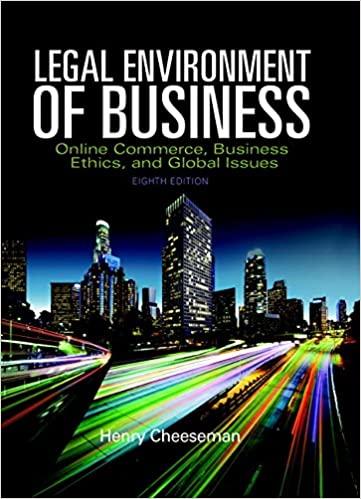Question
Please leave a comment or thoughts about following 2 questions 1. I agree with the court's reasoning and ruling over the unambiguous wording of the
Please leave a comment or thoughts about following 2 questions
1.
I agree with the court's reasoning and ruling over the unambiguous wording of the statute and lease. The decision implies that 1) the "innocent owner" defense is invalid since the plain language of the statute was broad enough to encompass any wrongdoing or wrongdoers; 2) HUD/PHAs have discretion to determine whether the household or just the wrongdoer gets evicted; and 3) through this discretion, they are able to weigh the interests of the individual against the interests of the housing community on a case-by-case basis. As Mr. Liu's letter indicates, the underlying dilemma for PHAs is to "act in a manner that protects that [sic] general welfare, while giving consideration - when you deem it appropriate - to the interests of individuals who share a household with the wrongdoer, but were otherwise unconnected with the wrongdoing." Through the court's decision, OHA's discretion employed for the four tenant evictions was affirmed. OHA provided one of the tenants, Mr. Walker, two violation notices before serving him an eviction, which demonstrates OHA's willingness to review issues on a case-by-case basis (128). They did not give the other tenants warnings. By the third violation, OHA needed to weigh and decided to prioritize the interests of the community over the individual tenant - to assure other tenants the "health, safety, or right to peaceful enjoyment of the premises."
In my analysis, I leaned towards Rosenbloom's legal approach. According to Rosenbloom, this approach views the individual as "a unique person in a unique set of circumstances" (224). The discretion afforded to the HUD and PHAs, as carefully worded so in the statute, allows them to consider individual tenant circumstances to decide appropriate action, rather than using a strict blanketed enforcement protocol. Similarly, an ethical lens grounded in constitutional law must be employed in order to fairly and reasonably balance the interests of one tenant and the public housing community at large.
2.
The Court's holding that Congress had already spoken to the issue of PHAs right to evict tenants regardless of their knowledge of the drug use of guests or co-signers is clearly the correct legal ruling. The language of the statute is unambiguous and the intent is made clear by a similar statute which does have forfeiture provision in cases in which the leaseholder was unaware of the drug use. In Congress' omission of a forfeiture provision from this statute it is clear that their intent was for their to be no provision since they had demonstrated themselves conscious of this legal question and capable of addressing in the language of the statute, thus the omission intended for the result to be that PHAs could evict any and all tenants in the case of drug use associated with their lease.
I believe this policy to be inhumane. While it is true that the court and Secretary Liu both emphasize that PHAs have the discretion to take into account other factors such as the effect an eviction would have on the family and their ability to find housing elsewhere. But this policy provides enormous latitude for the eviction of tenants who have guests or co-signers use drugs at the affordable housing site. While the safety of tenants and provision of a healthy and peaceful housing site is an important value, there are empirically proven better ways to combat drug use than evicting people. Eviction just displaces the issue to somewhere else in society when the government's aim should be to address the root causes of issues. The government is concerned with welfare in society as a whole and it certainly has greater power at it's own properties where it is the landlord compared to private properties but it is absolutely absurd that the government would endorse taking a drug-abuse-aggravating action such as eviction and call this a protective act. Unhoused people who are using drugs are more likely to use more drugs and more likely to be in a situation in which they must resort to violence or theft in order to survive. It is an appallingly regressive policy. Harm reduction, medically assisted treatment, and self-directed recovery are all data-proven methods that work to combat the negative effects of drug use and would be a much better investment of the governments' time and resources than evicting families and friends of people who use drugs.
Step by Step Solution
There are 3 Steps involved in it
Step: 1

Get Instant Access to Expert-Tailored Solutions
See step-by-step solutions with expert insights and AI powered tools for academic success
Step: 2

Step: 3

Ace Your Homework with AI
Get the answers you need in no time with our AI-driven, step-by-step assistance
Get Started


